|
|
|
Sort Order |
|
|
|
Items / Page
|
|
|
|
|
|
|
| Srl | Item |
| 1 |
ID:
153626
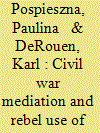

|
|
|
|
|
| Summary/Abstract |
Violence against civilians is portrayed as an antecedent of civil war, a cause, or both. Civil war creates opportune environments for planning and carrying out these acts that in turn can have detrimental effects on peace processes. Since not all civil war factions will see peace as beneficial, some actors may use violence to undermine the peace talks. The rebels may use indiscriminate violence to demonstrate their ability to exact costs on the government thus forcing the latter to negotiate. This article focuses upon acts of violence committed by rebel groups during mediated peace process. The central hypothesis is that violence against civilians increases the probability of mediation that in turn increases the prospects for violence. Using all civil war episodes from 1970 to 2008 as observations results from bivariate probit analysis endogenizing the choice of mediation bear out this theoretical argument.
|
|
|
|
|
|
|
|
|
|
|
|
|
|
|
|
| 2 |
ID:
097771
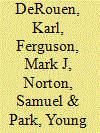

|
|
|
|
|
| Publication |
2010.
|
| Summary/Abstract |
Negotiated civil war terminations differ from their interstate war counterparts in that one side must disarm and cease to exist as a fighting entity. While termination through military victory provides a relatively more enduring peace, many civil wars end with peace agreements signed after negotiations. However, research has shown that the implementation of civil war peace agreements is difficult and prone to collapse. Often these failures are followed by recurrence of the conflict. In some cases, the agreements break down before key provisions are implemented. This article adds to this topic by focusing on the role of state capacity in peace agreement success. We argue that peace agreements and state capacity are necessary but not sufficient conditions for sustainable peace. The article employs a case study approach to explore the importance of state capacity in implementing civil war peace agreements. The role of third-party interventions is also considered. The cases (United Kingdom-Northern Ireland, Indonesia-Aceh, Burundi, Mali, and Somalia) include 14 peace agreements that vary by war type (secessionist or control over government), type of agreement (comprehensive or partial), levels of state capacity (high or low), and peace success (success, partial or failure), and each experienced third-party involvement in the peace process.
|
|
|
|
|
|
|
|
|
|
|
|
|
|
|
|
| 3 |
ID:
066413
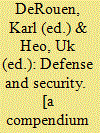

|
|
|
|
|
| Publication |
Santa Barbara, ABC-CLIO, Inc, 2005.
|
| Description |
2v.(lxi, 1013p.)
|
| Contents |
Vol.1: Angola-Mexico
Vol.2: New Zealand-Yugoslavia
|
| Standard Number |
1851097813
|
|
|
|
|
|
|
|
|
|
|
|
Copies: C:2/I:0,R:0,Q:0
Circulation
| Accession# | Call# | Current Location | Status | Policy | Location |
| 050276 | 355.0330003/DER 050276 | Main | On Shelf | General | |
| 050277 | 355.0330003/DER 050277 | Main | On Shelf | General | |
|
|
|
|
| 4 |
ID:
089014
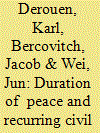

|
|
|
|
|
| Publication |
2009.
|
| Summary/Abstract |
Civil wars in Southeast Asia and the Pacific are perhaps the most intractable in the world and thus merit special attention. We adopt a regional approach for our analysis of the duration of peace after civil war terminations. Our contribution is three-fold: First, we capture all dyads (rebel versus government) rather than lumping multiple dyads into one war. This is appropriate in a region where there are multiple conflicts in a country at any one time. Second, we test a new conflict termination dataset developed at Uppsala University. These data allow us to offer a fine-grained analysis not normally found in the civil war literature. Third, we employ a method specifically suited to recurring data in a duration setting. The results generally support our hypotheses that wars in the region are intractable in the face of negotiated settlements and longer wars increase the duration of the subsequent peace. Also, there is a tendency for the peace to become longer with each recurrence. The impact of longer wars is obscured unless repeated events are carefully treated as non-independent events.
|
|
|
|
|
|
|
|
|
|
|
|
|
|
|
|
| 5 |
ID:
053512
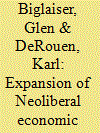

|
|
|
| 6 |
ID:
079949
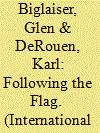

|
|
|
|
|
| Publication |
2007.
|
| Summary/Abstract |
In contrast to the 19th and early 20th centuries, the effects of security factors on foreign direct investment (FDI) have received limited interest in the post-Cold War era. Using panel data for 126 developing countries between 1966 and 2002, and controlling for macroeconomic conditions, economic reforms, and level of democratization, this essay tests the effects of "follow the flag" variables on U.S. FDI. Security factors can affect FDI in two stages: the initial decision over whether to invest and the second stage, which involves the amount invested. Our results indicate a selection effect and that follow the flag factors are influential both in the selection phase and in the main equation for U.S. investors. However, such results are not found for global investors, suggesting that positive links between economic and security goals only hold for U.S. firms
|
|
|
|
|
|
|
|
|
|
|
|
|
|
|
|
| 7 |
ID:
119674
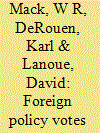

|
|
|
|
|
| Publication |
2013.
|
| Summary/Abstract |
This paper explores the role of foreign policy votes on presidential support in Congress. We postulate that a selection effect is inherent in this topic. Failing to consider that certain factors will influence whether a president takes a position on an issue in the first place can yield misleading results. For instance, presidents might not take positions during lame duck years or when their popularity is low. They might be more willing to take positions on international votes, votes requiring super majorities, or those that take place during a honeymoon period. In turn, this decision regarding position-taking can bias the outcome. We also capture the relationship between Congress and public opinion in our models as it is important to consider that the Congress is listening to its constituents as well. If the public identifies international problems as the most important to the nation, Congress might be more willing to vote in favor of the president on international votes. Testing key vote data from 1953 to 2003 for each chamber, we show that presidents are more likely to take positions if the vote is international, if the public identifies the "most important problems" as international ones, and if the vote requires a super majority for passage. They are less likely to take positions if they are up for reelection and are lame ducks. In turn, international votes, the percentage of the public identifying international problems as the most important, and the size of the president's majority have positive effects on presidential support. These findings are obscured if selection is not taken into account.
|
|
|
|
|
|
|
|
|
|
|
|
|
|
|
|
| 8 |
ID:
065701
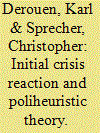

|
|
|
| 9 |
ID:
089324
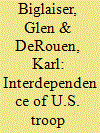

|
|
|
|
|
| Publication |
2009.
|
| Summary/Abstract |
The relationship between political conflict and trade has contributed to a riveting discussion in international relations about whether trade produces conflict, or whether conflict itself reduces trade. Most studies proxy "the flag" using militarized interstate disputes (MIDs). However, extensions of "the flag" might well obtain in environments short of MIDs. A more general way to proxy the flag is troop deployments. The deployment of military troops is an essential element of foreign policy. Using panel data for 126 developing countries from 1965 to 2002 and a two-stage least square approach, this essay investigates the relationship between trade and United States troop deployments. We find that trade and troops have a nonrecursive relationship: trade follows the flag and troops follow trade. Given the increased insecurity in the world today, the results are timely and reinforce previous research about the reciprocal relationship between the flag and trade.
|
|
|
|
|
|
|
|
|
|
|
|
|
|
|
|
| 10 |
ID:
107659
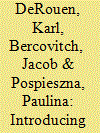

|
|
|
|
|
| Publication |
2011.
|
| Summary/Abstract |
Mediation is one of the few mechanisms the international community can deploy that will affect civil wars. This article introduces the dataset on mediation in civil wars - termed the Civil War Mediation (CWM) dataset. This is the first dataset to focus solely on civil war mediation. These data contribute to the present state of quantitative research on mediation in three important respects: the data are collected for the period of 1946-2004, are organized by mediation cases and by civil war episode, and provide detailed information about mediation incidences. The article first presents a few variables included in the dataset that are motivated by theoretical arguments from the literature. After a presentation of summary statistics, attention is turned to using the CWM data to explore the determinants of mediation. Mediation is shown to be a function of war type (territorial and internationalized wars are more likely to be mediated), war duration (the longer the war the higher the probability of mediation), supply-side factors (the number of democracies in the world and the global polity average), and stratum (subsequent wars are less likely to be mediated). Battle-related deaths also seem to increase the chances of mediation, though the relationship is only weakly significant. The article concludes with suggestions for future research that can benefit from the dataset.
|
|
|
|
|
|
|
|
|
|
|
|
|
|
|
|
| 11 |
ID:
136617
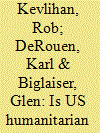

|
|
|
|
|
| Summary/Abstract |
The United States has made repeated public commitments to provide humanitarian aid based on need alone. However, some scholars suggest that US self-interest is a stronger predictor of US humanitarian assistance than need. We examine the tension between self-interest and need by studying the allocations made by the US Agency for International Development's Office of US Foreign Disaster Assistance for more than 100 developing countries between 1989 and 2009. Moving beyond previous studies, we measure need based on both natural (floods, earthquakes, hurricanes) and man-made (conflict related) disasters. Contrary to much previous scholarship, we find need factors shape the decision to provide aid more than US self-interest does. We also find important differences in how much humanitarian assistance is distributed in the pre- and post-9/11 eras, with foreign policy affinity to the United States and battle deaths playing useful roles in how much aid a country receives in the post-9/11 period. The findings generally point to the ongoing importance of need as a driver of humanitarian aid decisions.
|
|
|
|
|
|
|
|
|
|
|
|
|
|
|
|
| 12 |
ID:
077776
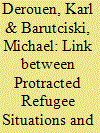

|
|
|
|
|
| Publication |
2007.
|
| Summary/Abstract |
Most of the refugees in the world today are mired in protracted refugee situations (PRS). While PRS around the world last for years with no apparent solution on the horizon, the problem is especially prominent in Africa where traditional refugee protection approaches and solutions are not working. This study applies an innovative framework recently developed to study civil war to the analysis of PRS. The enduring rivalry framework was developed for studying the long-term dynamics of serious conflicts between pairs of states. By applying this framework to rivals in civil wars, this study presents a new way of thinking of PRS by tracing the problem back to the enduring internal rivalries that cause and sustain them.
|
|
|
|
|
|
|
|
|
|
|
|
|
|
|
|
| 13 |
ID:
064479
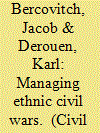

|
|
|
| 14 |
ID:
157830
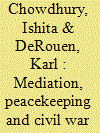

|
|
|
|
|
| Summary/Abstract |
The post-civil war agreement phase is vulnerable to credible commitment problems, a lack of government capacity to implement, and/or mutual vulnerability to retribution from violating the agreement. This study’s main contribution is to demonstrate the combined utility of mediation and UN peacekeeping. Mediation builds trust and confidence and works with the parties to design an efficacious agreement conducive to, among other features, tamping down post-agreement violence. Peacekeeping stems violence and facilitates the implementation of the agreement. Agreements that are mediated and followed by UN peacekeeping are expected to be more robust in terms of staving off violence. We report the effects of the mediation–peacekeeping interaction using a method correcting for a common misinterpretation of interaction terms. We test logit and hazard models using a sample of full and partial civil war peace agreements signed between 1975 and 2011. Controlling for agreement design, democracy, and income per capita, the results indicate mediation and its interaction with peacekeeping reduce the probability of renewed/continuing violence and have a positive impact on agreement duration. We also report brief case study evidence from the 1990s peace process in Guatemala.
|
|
|
|
|
|
|
|
|
|
|
|
|
|
|
|
| 15 |
ID:
103534
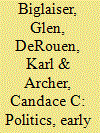

|
|
|
|
|
| Publication |
2011.
|
| Summary/Abstract |
The Financial Crisis in the late 1990s and the ongoing crisis have showed the importance of creating an early warning system (EWS) to lessen economic, political, and foreign policy fallout. Surprisingly, the EWS literature rarely considers the role of political institutions to detect economic dangers that can be harbingers of conflict. Controlling for common explanations in the literature, we use panel data for fifty developing countries from 1987 to 2004 to investigate the effect of political determinants for predicting economic crises. Although most political variables appear to have little influence in forecasting defaults or currency crises, models specified with bond ratings from the credit rating agencies can be helpful for predicting the onset of crisis. Our research is a first step toward gaining insights into how best to anticipate crisis that may prove beneficial particularly in light of the current global crisis.
|
|
|
|
|
|
|
|
|
|
|
|
|
|
|
|
| 16 |
ID:
053913
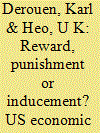

|
|
|
| 17 |
ID:
077455


|
|
|
|
|
| Publication |
2007.
|
| Summary/Abstract |
The importance of sovereign bond ratings has grown recently as assessments by credit rating agencies (CRAs) influence the cost of capital. Understanding how CRAs determine country ratings is difficult based on the secretive nature of these agencies. Controlling for the common explanations in the literature, we use panel data and interviews to investigate the role of the "democratic advantage" and other determinants on bond ratings set by Moody's Investor Services, Standard and Poor's, and Fitch Ratings for fifty developing countries from 1987 to 2003. We find that regime type and most other political factors have little effect on bond raters. Instead, trade, inflation, growth, and bond default strongly affect sovereign ratings. The message for policymakers in developing countries is that factors that support bond repayment are most useful for enhancing CRA ratings
|
|
|
|
|
|
|
|
|
|
|
|
|
|
|
|
| 18 |
ID:
097560
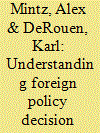

|
|
|
|
|
| Publication |
Cambridge, Cambridge University Press, 2010.
|
| Description |
xi, 208p.
|
| Standard Number |
9780521700092
|
|
|
|
|
|
|
|
|
|
|
|
Copies: C:1/I:0,R:0,Q:0
Circulation
| Accession# | Call# | Current Location | Status | Policy | Location |
| 055096 | 327.101/MIN 055096 | Main | On Shelf | General | |
|
|
|
|
| 19 |
ID:
116335
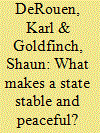

|
|
|
|
|
| Publication |
2012.
|
| Summary/Abstract |
This study explores state stability using various governance and development indicators. We find stability is associated with state capacity and public goods, the legal-rational state, legitimacy, good governance and corruption, income/capita and democracy and human rights. In particular, we show the importance of democracy, legitimacy, rule of law and secularity. Environmental degradation and debt dependency undermine stability. Revenue collection, corruption, rule of law, independent judiciary and exports can be important to stability even in the face of incomplete democracy and lower GDP per capita. These factors are relatively more important in low-income states.
|
|
|
|
|
|
|
|
|
|
|
|
|
|
|
|
|
|
|
|
|